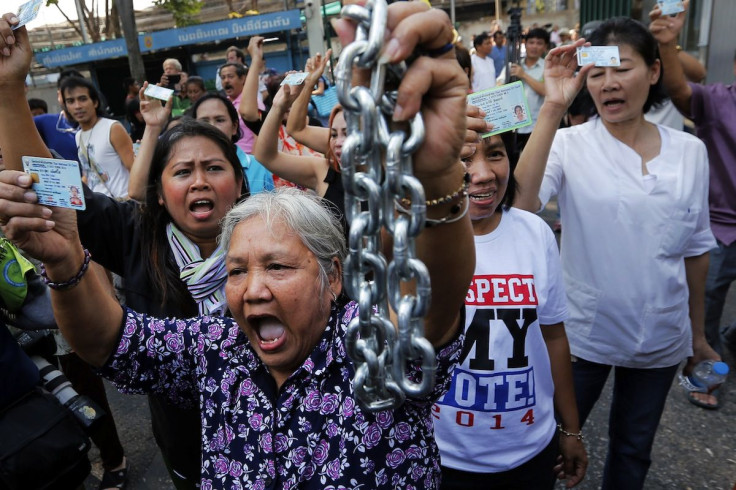Thailand Tourism Officials Say Bangkok Remains Safe And Open For Business

The turbulence in Thailand showed no signs of abating Sunday after protesters disrupted general elections and halted voting in parts of Bangkok and the south. Prime Minster Yingluck Shinawatra had called the vote to heed off weeks of anti-government demonstrations aimed at toppling her government, but analysts believe the elections only proved that the nation’s deepening political crisis was far from over.
A vast area of greater Bangkok was under a state of emergency Sunday night, though there were no reports of any major incidents of violence. Most banks, hotels, convention centers, restaurants and entertainment complexes in the capital remained open, as did all tourist attractions in and around the city such as the Grand Palace, Temple of the Emerald Buddha, Vimanmek Mansion and Siam Paragon.
“While the demonstrations are taking place in the central Bangkok areas, life in most parts of the Thai capital and throughout Thailand continues as usual. However, tourists are advised to be vigilant and avoid the demonstration areas for their own safety and security,” the Tourism Authority of Thailand, or TAT, said in a Feb. 2 situation update.
“There is currently no curfew in place in Bangkok or any other parts of Thailand,” it added. “Local residents and international visitors can continue to travel within Bangkok and other destinations in the country as usual.”
TAT Governor Thawatchai Arunyik suggested at an ASEAN Tourism Forum in Malaysia last week that it was a good time for travel buyers and tourists to discover new destinations, especially those in the provinces bordering Cambodia, Laos and Myanmar.
“This is the best time to discover the wonderful new destinations that will emerge in the future thanks to the Asian Highway. Not many people know that there are four bridges connecting Thailand to Laos over the Mekong River and that it is now possible to drive from the eastern Thai border town of Aranyaprathet to Siem Reap, gateway to the famous temples of Angkor Wat in Cambodia,” he said.
Mobility remains the biggest issue facing visitors to the capital, with protesters regularly cutting off major Bangkok intersections in a self-styled shutdown. As a result, popular tourist areas such as Silom, Asok and the Ratchprasong intersection (home to several international hotels like Four Seasons, Hyatt and InterContinental) have been intermittently inaccessible.
Tourism officials urged visitors to depart for their scheduled flights out of Suvarnabhumi and Don Mueang International Airports at least four hours ahead of time. TAT set up tourist care units at both airports last month, along with a tourist care center at the Sports Authority of Thailand at Hua Mak Stadium. It said it was working with the Tourist Police, Immigration Bureau, Metropolitan Police Bureau, Railway Police Unit, Tourism Council of Thailand, Thai Hotels Association, Road Passenger Transport Association and Association of Thai Travel Agents to ensure all involved in the tourism industry were united in their efforts.
Thailand’s Minister of Tourism and Sports Somsak Phurisisak recently predicted that January arrivals would fall by half to 1 million, with some hotels in the capital, Pattaya and elsewhere experiencing occupancy rates of just 30 percent. Much of that decline is thought to have come from the Chinese market after the nation warned its citizens to avoid protest sites and reconsider nonessential travel to Thailand over the popular Lunar New Year travel period.
At least 45 other countries, including the U.S., Canada, Britain, France, Germany, Japan and Brazil, have issued travel alerts for Thailand since protests escalated in mid-January. After the government imposed a state of emergency for Bangkok on Jan. 22, several nations urged citizens to reconsider trips altogether, while Singapore Airlines, Thai Airways and other Asian carriers axed flights into Bangkok due to a drop in demand.
The Tourism Council of Thailand estimated that the loss of revenue last month alone will total 22.5 billion baht ($685 million), though analysts point out that “Teflon Thailand” has been quick to rebound after economic shocks both natural (the 2004 tsunami) and political (the less peaceful protests of 2008 and 2010).
The current round of demonstrations in Thailand erupted back in November when the government attempted to force through a political amnesty bill that would have enabled the return of former leader Thaksin Shinawatra, Yingluck’s billionaire brother who was ousted in a military coup in 2006 on charges of corruption. Thaksin now lives in self-imposed exile in Dubai to avoid a prison term, though he argues his punishment was politically motivated.
Many of the protesters gathering on Bangkok’s streets come from the middle and upper class, and claim Yingluck’s government is controlled by her brother. Fearing that she could win the Feb. 2 elections on the back of support in the rural north and northeast, they’ve called for her to step down and be replaced by an appointed “people’s council” to push through electoral reforms.
© Copyright IBTimes 2024. All rights reserved.






















